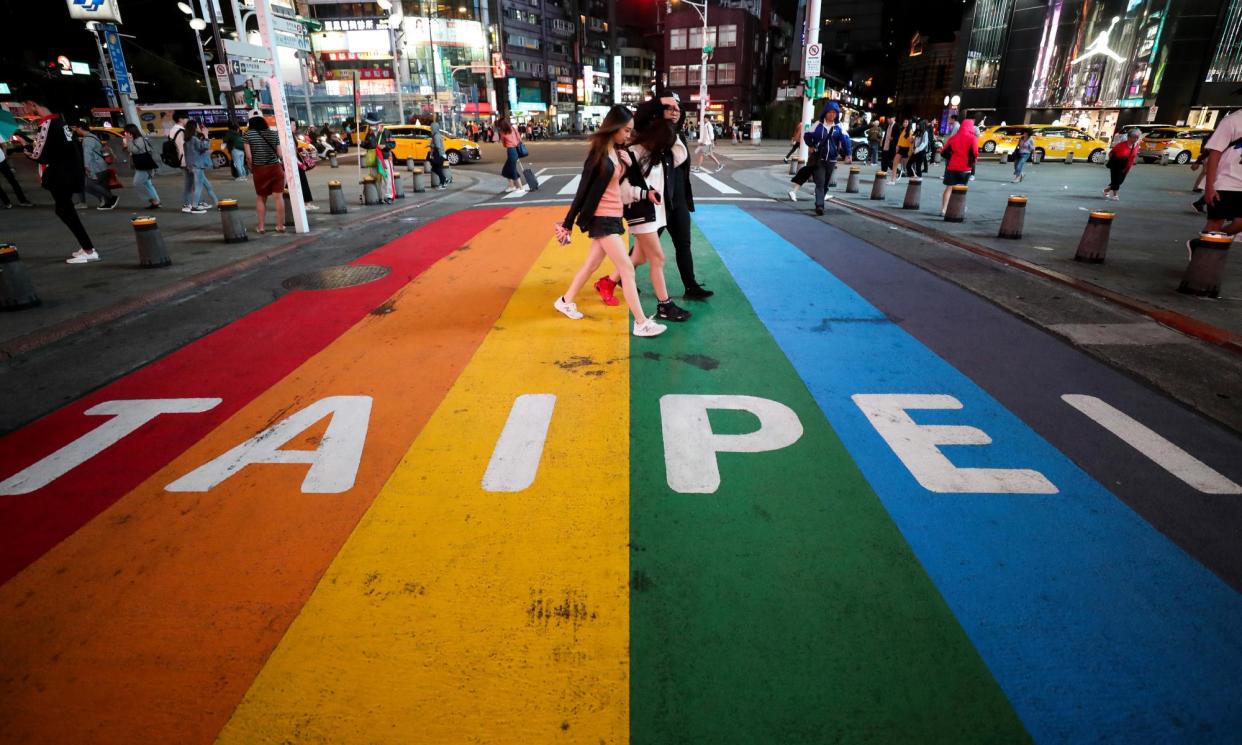Ryan and Righ want to get married in Taiwan – they can’t because of China’s same-sex marriage ban

Ryan and Righ like to compare their relationship to a Shakespearean drama. The two met when Righ, originally from China, visited Ryan’s Taiwanese city of Kaohsiung in 2016. A brief conversation next to the city’s “Love River” soon developed into a romance that defied the long-running cross-strait tensions between their homes.
Although Righ returned to the Chinese capital of Beijing, and Ryan, who runs a guesthouse, stayed in Taiwan, the couple entered a long-distance relationship for years before deciding they wanted to get married.
“Like Romeo and Juliet, we hoped for a happy ending,” Ryan says. “Their love had many obstacles, but if it’s meant to be, nothing can stop it.”
When Taiwan became the first place in Asia to legalise same-sex marriage in 2019, they thought their happy ending was in sight.
Related: The Guardian view on Taiwan and same-sex marriage: a sudden victory years in the making | Editorial
But while the rest of Taiwan’s LGBTQ+ community celebrated, their joy was dulled when they learned they would be among more than 100 couples barred from marriage due to one party’s Chinese nationality.
“We were feeling sad but had to join in the celebrations for others, even though we couldn’t celebrate for ourselves,” Righ says.
For national security reasons, and because of Taiwan’s complicated relationship with China, Taiwan governs most cross-strait marriages under a distinct set of laws that require couples to marry in China before having the union certified in Taiwan. Couples are then subject to interviews to authenticate the marriage, and a screening process that ensures the Chinese spouse does not pose a security or intelligence threat.
But with gay marriage still impossible in China, many couples can’t fulfil the first step of the process, leaving them unable to get an interview, and stuck in legal limbo.
Advocacy groups claim that Taiwan remains the only place in the world to restrict gay marriage on grounds of nationality.
Taiwanese citizens like Ryan have the right to live and work in China, but many same-sex couples are unwilling to relocate to the Chinese mainland due to its lack of LGBTQ+ freedoms.
“We hope to gain societal recognition and to have our marriage acknowledged and protected. Mainland China does not recognise it,” says Righ.
Now, some cross-strait couples have begun taking Taiwanese authorities to court. With the support of the Taiwan Alliance to Promote Civil Partnership Rights (TAPCPR), a local human rights organisation, Ryan and Righ are at the forefront of these legal battles.
The couple got married in the United States, where gay marriage is legal, and have been battling to have this union acknowledged in Taiwan. If they succeed, they are likely to become Taiwan’s first ever cross-strait gay couple to get married.
“Our lawsuit is significant for the entire Taiwan-mainland LGBTQ community. Everyone is eagerly anticipating the outcome,” says Ryan.
The case focuses on their ability to begin the marriage interview process, and to directly register their US marriage at a Taiwanese registration office. The courts have ruled in favour of elements of their case on two occasions, but after more than three years of litigation the couple remain unable to tie the knot.
Following a ruling in early August stating that the Immigration Department should grant Ryan and Righ access to the interview process, Taiwan’s Mainland Affairs Council noted that they are aware the matter is “likely to cause controversy in society” and were conducting further consultations.
With China-Taiwan relations and LGBTQ+ issues still contentious for some in Taiwan, TAPCPR argues that the issue has become an administrative one, with no government department willing to take responsibility for making a final decision.
“Cross-Straits couples should obviously have a legal basis to marry in Taiwan,” says Victoria Hsu, a lawyer for the TAPCPR. “I think this is a matter of political will.”
If the president were to “green light” cross-strait marriage equality, then the issue would soon be solved, Hsu claims.
“We hope our lawsuit will change the government’s attitude and prompt it to take necessary action to achieve true marriage equality,” Hsu says.
The ruling Democratic Progressive Party told the Guardian that “Taiwanese citizen’s freedom to marry shall be respected and protected by the law regardless [of] the nationality of their fiance. We believe the government will propose a draft of law balancing people’s right to marry and national security.”
“The general mood within our community is mostly pessimistic, with some people feeling too disheartened to even get angry. Anger doesn’t seem to help; it’s more of a deep sadness, a sense that there’s no hope left,” Ryan says.
But, he says, the legal action is like a lifeline for the entire community.
“Without it, people would feel even more helpless.”
With Edison Tseng


